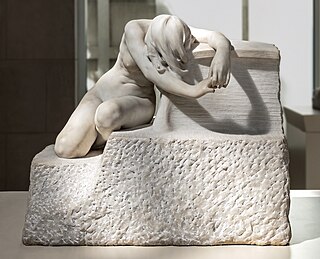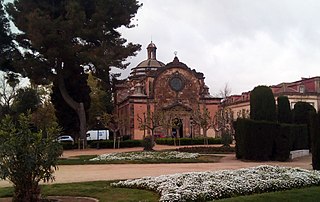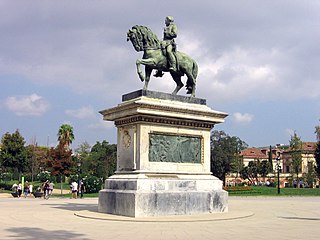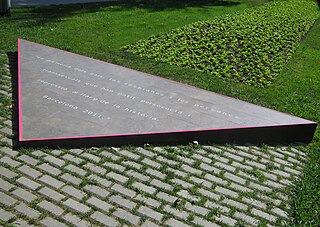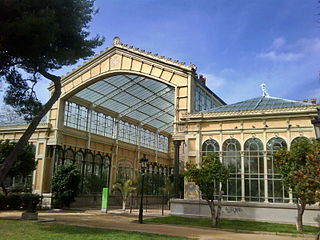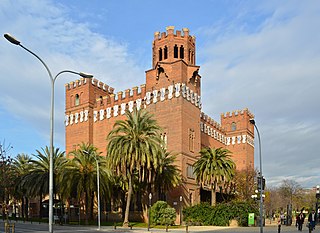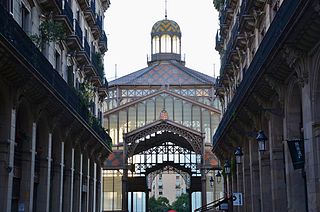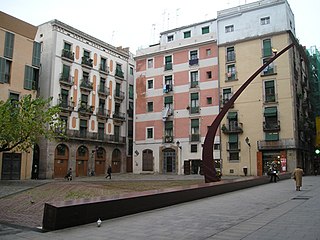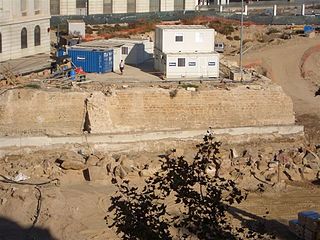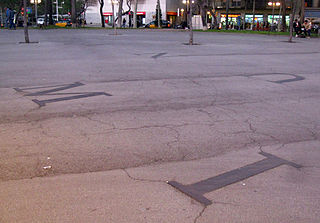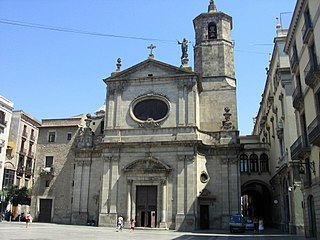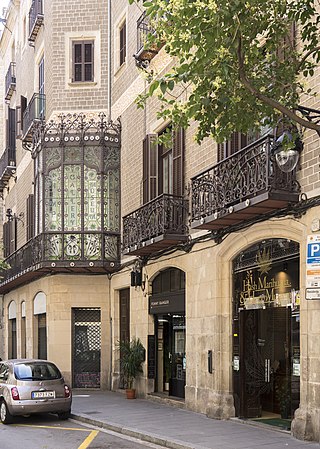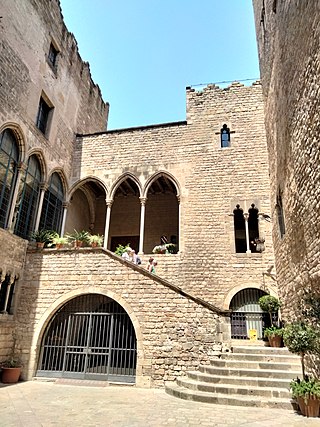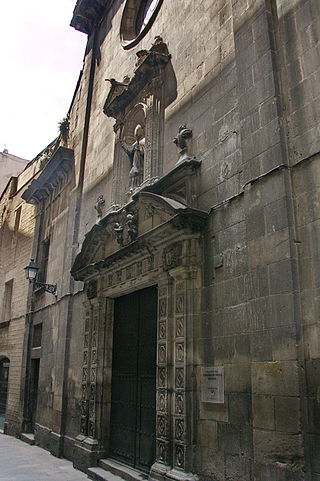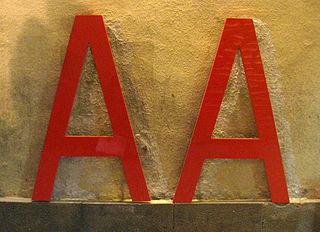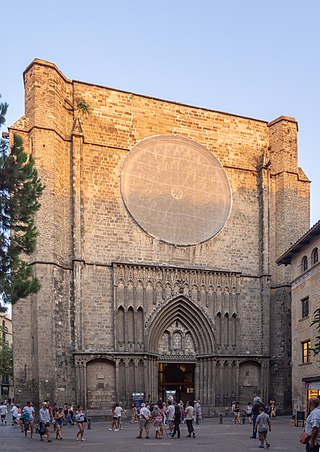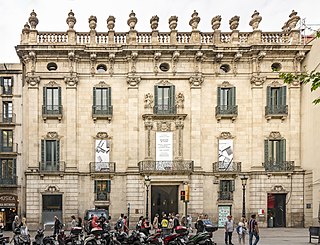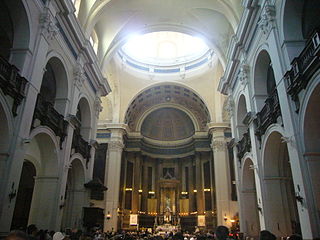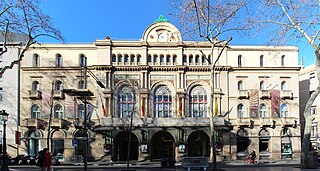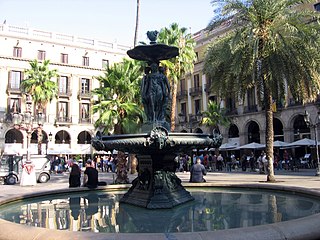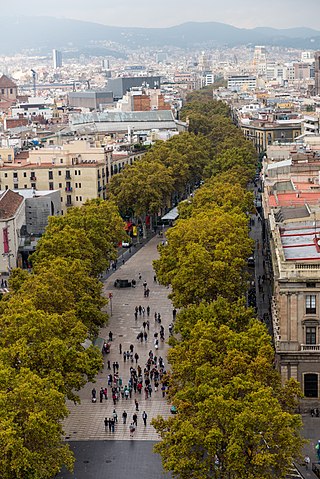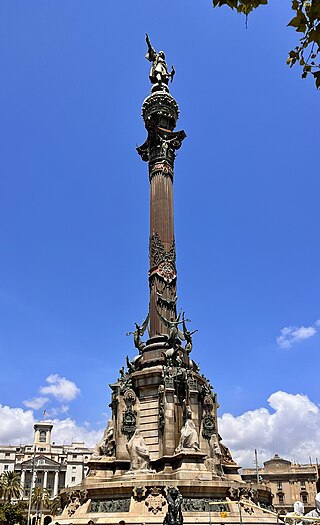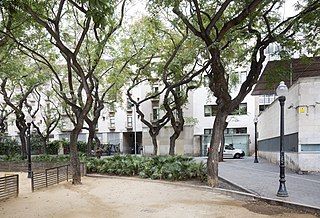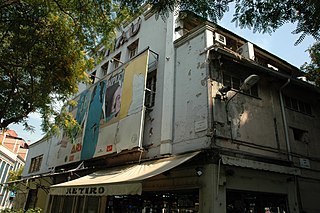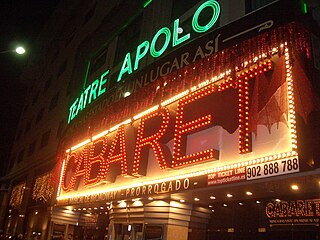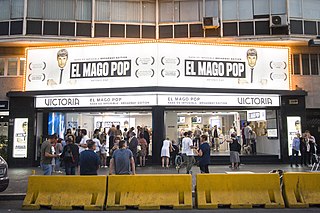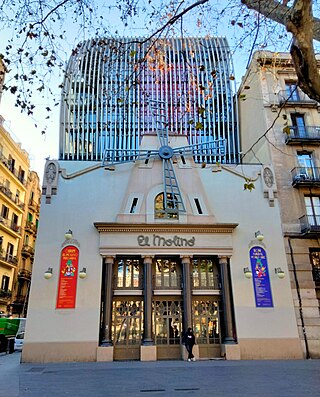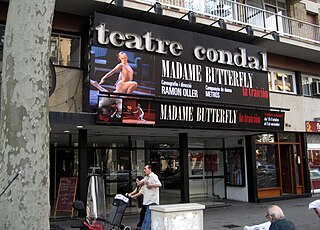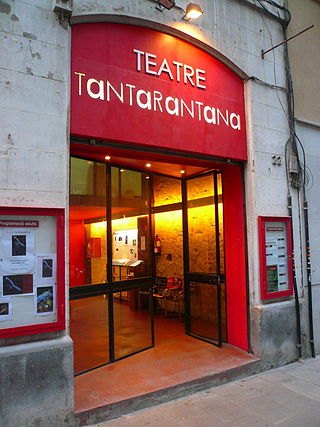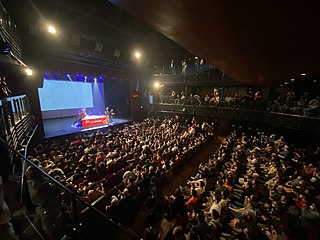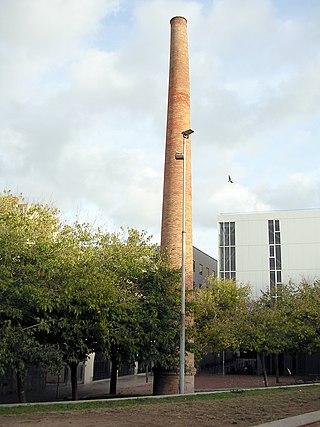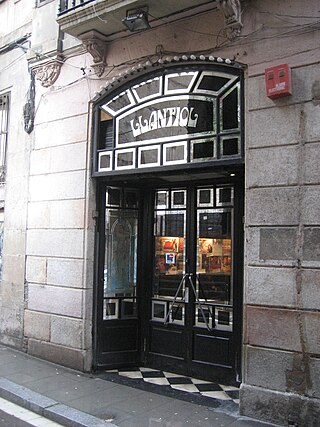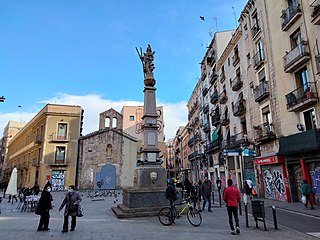Self-guided Sightseeing Tour #4 in Barcelona, Spain
Legend
Guided Free Walking Tours
Book free guided walking tours in Barcelona.
Guided Sightseeing Tours
Book guided sightseeing tours and activities in Barcelona.
Tour Facts
10.5 km
225 m
Experience Barcelona in Spain in a whole new way with our free self-guided sightseeing tour. This site not only offers you practical information and insider tips, but also a rich variety of activities and sights you shouldn't miss. Whether you love art and culture, want to explore historical sites or simply want to experience the vibrant atmosphere of a lively city - you'll find everything you need for your personal adventure here.
Activities in BarcelonaIndividual Sights in BarcelonaSight 1: Desolation
Desolation is a sculpture that was crafted by Josep Llimona in 1907, which now resides in the National Art Museum of Catalonia in Barcelona.
Sight 2: Capella Castrense
The Citadel Chapel is a military parish church located in the Parc de la Ciutadella in Barcelona, listed as a cultural asset of national interest.
Sight 3: Barcelona a Prim
Barcelona a Prim is a sculptural monument located in the Parc de la Ciutadella in Barcelona, in the Ciutat Vella district. It was created in 1887 with an architectural design by Josep Fontserè i Mestre, while the sculptural part was in charge of Lluís Puiggener. The original work was destroyed in 1936 and replaced in 1948 by another by Frederic Marès. The monument is dedicated to the Catalan military and politician Joan Prim i Prats, President of the Council of Ministers of Spain and one of the architects of the 1868 Revolution. This work is registered as a Cultural Asset of Local Interest (BCIL) in the Inventory of Catalan Cultural Heritage with the code 08019/870.
Sight 4: Triangle rosa
The monument in memory of the gays, lesbians and retaliated transsexual people is a monument erected on March 21, 2011 in the Citadel Park by the City Council of Barcelona (Spain).
Wikipedia: Monumento en memoria de los gais, lesbianas y personas transexuales represaliadas (ES)
Sight 5: Hivernacle
The Greenhouse is a work of Barcelona's iron architecture protected as a Cultural Asset of Local Interest since 2000, located in the Parc de la Ciutadella, built between 1883 and 1887.
Sight 6: Castle of the Three Dragons
The Castle of the Three Dragons, is the popular name given to the modernisme building built between 1887 and 1888 as a Café-Restaurant for the 1888 Universal Exposition of Barcelona by Lluís Domènech i Montaner. This name was probably adopted from the 1865 play by Serafí Pitarra.
Sight 7: El Born Centre de Cultura i Memòria
Get Ticket*Mercat del Born is a former public market and one of the most important buildings in Barcelona, Catalonia, Spain constructed with iron. Located in the lower and eastern side of the la Ribera neighborhood, it is the largest covered square in all of Europe and marked the start of Modernisme in Catalan architecture.
Sight 8: Fossar de les Moreres
The Fossar de les Moreres is a memorial square in Barcelona, adjacent to the basilica of Santa Maria del Mar. The plaza was built over a cemetery where defenders of the city were buried following the Siege of Barcelona at the end of the War of the Spanish Succession in 1714. The plaza features a memorial to the fallen Catalans of the war, with a torch of eternal flame and a heroic poem by Frederic Soler, "El Fossar de les Moreres".
Sight 9: Font del Geni català
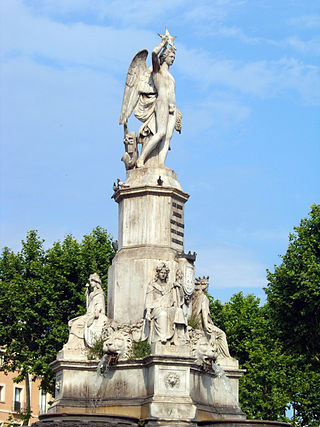
The Fountain of the Catalan Genius is a monument located in the centre of the Pla de Palau in Barcelona, listed as a cultural asset of local interest. It is one of the few surviving examples of monumental sculpture in the Empire style.
Sight 10: Baluard de Migdia i Muralla de Mar
The bastion of Migdia is one of the eleven bastions that the medieval and modern walls of Barcelona had until the whole of the city walls was demolished in the nineteenth century. The Baluard de Migdia was the scene of several episodes in the history of Barcelona, including the violent battles that took place on the eleventh of September 1714. The bastion was rediscovered in 2007, near Estació de França and Barceloneta Station, and its current remains are part of the architectural and historical heritage of the city of Barcelona.
Sight 11: Rosa dels Vents
The Wind Rose is an abstract sculpture located in the Plaça de Pau Vila in Barcelona, in front of the Palau de Mar. Work of the German artist Lothar Baumgarten, it consists of metal letters embedded in the pavement of the square, which form the eight names of the winds of Catalonia, each oriented in the direction that the wind is coming from. It is inspired by the poem Veles e vents by Ausiàs Marc. It was inaugurated on July 21, 1992, a few days before the opening of the Barcelona Olympic Games.
Sight 12: A Galceran Marquet
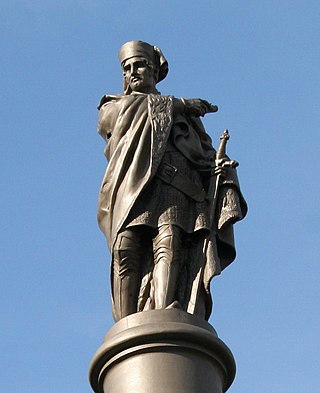
A Galceran Marquet is a monument in homage to the Catalan vice-admiral Galceran Marquet, located in the Plaça del Duc de Medinaceli in Barcelona. Created in 1851, it was the work of the architect Francesc Daniel Molina and the sculptor Damià Campeny, assisted in the decoration of the base by Josep Anicet Santigosa. It is listed as a Cultural Asset of Local Interest.
Sight 13: Basilica of Our Lady of Mercy
The Basilica of Our Lady of Mercy is a Baroque-style basilica in Barcelona, Catalonia. Our Lady of Mercy has been the patron saint of the city of Barcelona since 1687.
Sight 14: Museu de la Marihuana
The Hash Marihuana & Hemp Museum is a museum located in Barcelona, Spain dedicated to the culture of cannabis that opened on May 9, 2012.
Sight 15: Roman Wall
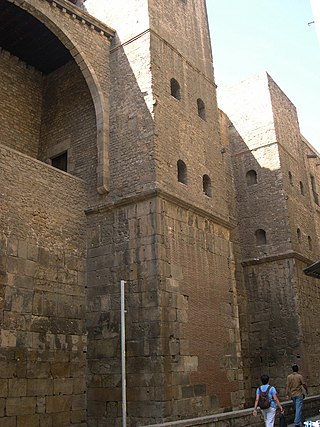
The Roman Wall of Barcelona is a work declared a Cultural Asset of National Interest. From Plaça Nova, it went along Avinguda de la Catedral, Carrer de la Tapineria and Carrer del Sotstinent Navarro, Plaça dels Traginers, and Carrer del Correo Vell, Carrer del Regomir, Carrer d'Avinyó, Carrer dels Banys Nous and Carrer de la Palla.
Sight 16: Palau Requesens
The Requesens Palace, also known as the Countess of Palamós, is a building in the Gothic Quarter of Barcelona declared a cultural asset of national interest. It is currently the headquarters of the Royal Academy of Letters and also houses the Gallery of Illustrious Catalans.
Sight 17: Església de Sant Sever
The church of Sant Sever is located on the street of the same name in the Gothic Quarter of Barcelona, very close to the Cathedral, and is listed as a Cultural Asset of Local Interest. Unlike most of Barcelona's churches, it was not destroyed during the Civil War, which is why the interior, an example of Catalan Baroque, has been so well preserved. Since 2002, it has been part of the chapter of the Cathedral of Barcelona.
Sight 18: Barcelona Shoe Museum
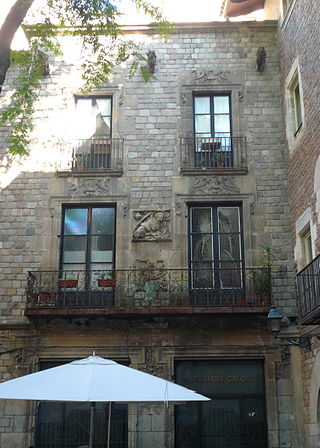
The Barcelona Footwear Museum is a small museum located in the Gothic Quarter of Barcelona, in Plaça de Sant Felip Neri that was inaugurated in 1970 and closed at the end of 2015. He stayed in the House of the Shoemakers' Guild, headquarters of the brotherhood of master shoemakers. The building is a work protected as a cultural asset of local interest.
Sight 19: Sinagoga Major de Barcelona
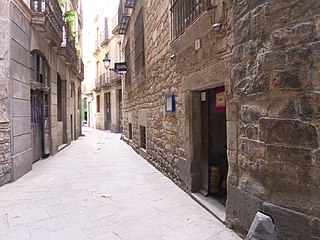
The House at Carrer de Salomó ben Adret, 7 is a building located on the street of the same name on the corner of Marlet Street in Barcelona, listed as a cultural asset of local interest. On the ground floor the remains of the old Main Synagogue of Barcelona are preserved.
Sight 20: Lletres gimnastes
Lletres Gimnastes is a work of visual art created by the Catalan poet and visual artist Joan Brossa i Cuervo in 1997. It was created for the El Ingenio store, at that time the oldest in its field in Barcelona, as a corporeal poem and to pay homage and remember Mr. Cardona, founder of the establishment.
Sight 21: Parròquia Basílica de Santa Maria del Pi
Santa Maria del Pi is a 15th-century Gothic church in Barcelona, Catalonia, Spain. It is situated on the Plaça del Pi, in the Barri Gòtic district of the city.
Sight 22: Joan Miró pavement mosaic
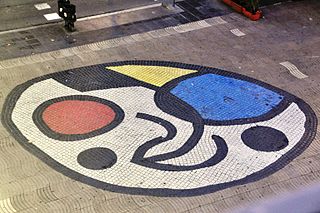
El Mosaic del Pla de l'Os també conegut com a Paviment Miró és una obra de 1976 feta per Joan Miró que es troba al Pla de la Boqueria, a la Rambla de Barcelona, camí natural de qui va o ve del mar a la ciutat. L'obra fou inaugurada el 30 de desembre del 1976, i està inclosa en el catàleg Art Públic de Barcelona. El mosaic va ser executat per Joan Gardy-Artigas, amb la col·laboració dels tallers Escofet, especialitzats en peces de terratzo.
Sight 23: Palau de la Virreina
The Virreina Palace is a building in the city of Barcelona. Situated on the famous La Rambla avenue, today it houses the headquarters of the City Council's Culture Institute, the Institut de Cultura de Barcelona (ICUB) and hosts various temporary art exhibitions and cultural events.
Sight 24: Església de Sant Agustí Nou
The convent of Sant Agustí Nou was a group of buildings belonging to the Augustinian order, of which some remains still remain, such as the old library, now a hotel, and the church, listed as a cultural asset of local interest.
Sight 25: Gran Teatre del Liceu
The Gran Teatre del Liceu, or simply Liceu, is a theater in Barcelona, Spain. Situated on La Rambla, it is the city's oldest theater building still in use for its original purpose.
Sight 26: Font de les Tres Gràcies
The Fountain of the Three Graces is located in the Plaça Reial in Barcelona, and is listed as a cultural asset of local interest. It was created in 1867 by Antoine Durenne on a design by Louis-Tullius-Joachim Visconti, and installed in 1876 with an architectural project by Antoni Rovira i Trias. Nearby are the lampposts designed by Antoni Gaudí for the square.
Sight 27: La Rambla
La Rambla is considered the most well known street in central Barcelona. A tree-lined pedestrian street, it stretches for 1.2 kilometres connecting the Plaça de Catalunya in its center with the Christopher Columbus Monument at Port Vell. La Rambla forms the boundary between the neighbourhoods of the Barri Gòtic to the east and the El Raval to the west.
Sight 28: Columbus Monument
The Columbus Monument is a 60 m (197 ft) tall monument to Christopher Columbus at the lower end of La Rambla, Barcelona, Catalonia, Spain. It was constructed for the Exposición Universal de Barcelona (1888) in honor of Columbus' first voyage to the Americas. The monument serves as a reminder that Christopher Columbus reported to Queen Isabella I and King Ferdinand V in Barcelona after his first trip to the new continent.
Sight 29: Jardins de les Voltes d'en Cirés
The Jardins de les Voltes d'en Cirés are a public space in the Raval district of Barcelona, located between Avinguda de les Drassanes and Carrer Nou de la Rambla, close to facilities such as the Drassanes Primary Care Centre, the Drassanes Civic Centre and the Official School of Languages.
Sight 30: Teatre Arnau
The Arnau Theatre is a building located at Avinguda del Paral·lel, 60 in Barcelona, listed as an asset with elements of interest.
Sight 31: Teatre Apolo
The Apolo Theater is a theatrical space located at no. 59 Avinguda del Paral·lel in Barcelona, in the Poble-sec neighbourhood. The old Apolo was built in 1901 and, uninterruptedly until today, except during the COVID-19 pandemic episode in Catalonia between 2020 and 2021, it has offered variety, music and theater shows.
Sight 32: Teatre Victòria
The Teatre Victòria is a theatre in Barcelona, Spain.
Sight 33: Sala Hiroshima
The Sala Hiroshima was an independent stage facility located in the Poble-sec district of Barcelona, very close to the Sala Apolo, in a premises on Carrer Vila i Vilà that had been an old elevator factory. The venue was only in operation for seven years, from 2015 to 2021, and immediately became a benchmark thanks to its eclectic, contemporary and unconventional programming. Its artistic director was the Argentine dancer and actor Gaston Core.
Sight 34: El Molino
El Molino is a café-concert in Barcelona, one of the most renowned in Europe during much of the twentieth and nineteenth centuries, and has always been considered a space that transgressed the permitted limits, with a great capacity to create its own languages, with a double meaning, with the motive of being able to escape the censorship of each era. With its characteristic red mill blades on the façade, it was the most famous of the theatres on the Paral·lel, an avenue that came to be baptised as "the street of the theatre of Europe", due to the large concentration of scenic spaces it had.
Sight 35: Condal
The Teatre Condal is a theater located in the Paral·lel, 91. Opened in 1903, it continues to operate, in a new building.
Sight 36: Teatre Tantarantana
The Teatre Tantarantana is a performance hall in Barcelona opened in 1992 at no. 16 of the street of the same name, which in 1996 moved to its current location at Carrer de les Flors, 22 del Raval.
Sight 37: Barts
The Gran Teatre Espanyol is a theatre located at Avinguda del Paral·lel, 62 in the city of Barcelona. Between 1892 and 1980, it operated under different names, and also as a cinema and discotheque. There is currently the Paral·lel 62 space.
Sight 38: Jardins de Sant Pau del Camp
The gardens of Sant Pau del Camp are a one-hectare public space around the monastery of the same name, in the Raval district of Barcelona.
Sight 39: Cafè-Teatre el Llantiol
El Llantiol is an emblematic café-theatre with a modernist aesthetic located in the Raval district of Barcelona. In 1982 the hall was awarded the FAD Sebastià Gasch Prize for Paratheatrical Arts.
Sight 40: Plaça del Pedró
The Plaça del Pedró is a square in the Raval district of Barcelona. It has a triangular shape with two sides delimited by Carrer del Carme and Carrer de l'Hospital, which join in Carrer de Sant Antoni Abat.
Share
Disclaimer Please be aware of your surroundings and do not enter private property. We are not liable for any damages that occur during the tours.
GPX-Download For navigation apps and GPS devices you can download the tour as a GPX file.
